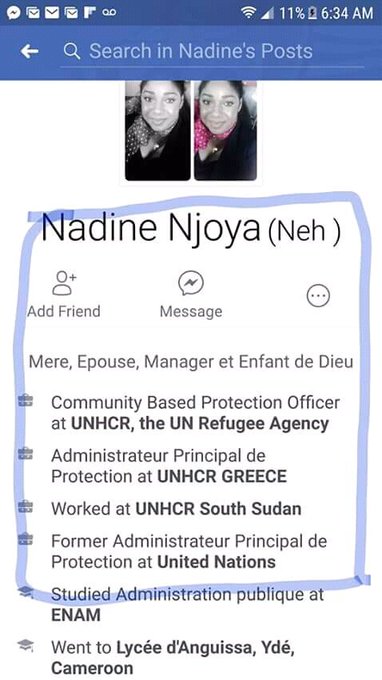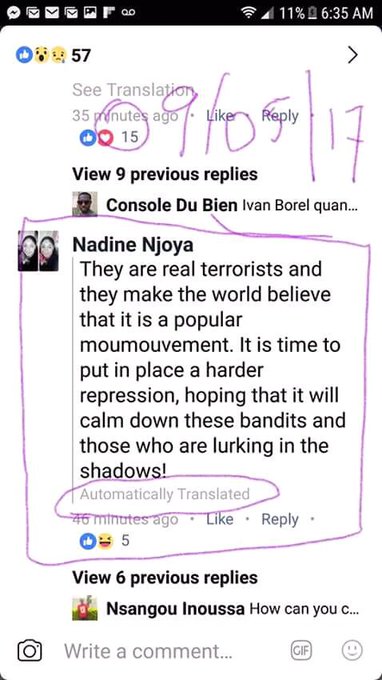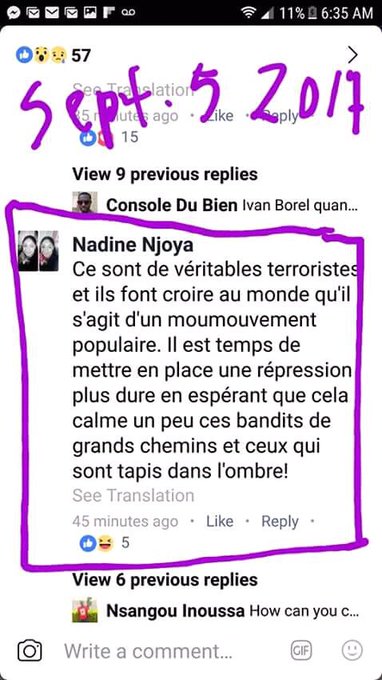By Matthew Russell Lee
UNITED NATIONS, September 17 – How does the UN respond when its staff call for "harder repression" of their opponents, linking themselves with the UN? The spokesman for UN Secretary General Antonio "Mr. Refugees" Guterres three times refused to answer this question from Inner City Press, UN video here.
Then UN's refugee agency UNHCR has provided a bureaucratic answer, but an answer nonetheless, complete with a link to an online form. But on September 16, UNHCR declined to provide any update, see below. We will continue to follow this case of a Francophone Cameroonian UNHCR staffer who called for more of the crackdown already underway from the Paul Biya government in Anglophone Cameroon, deriding the Southern Cameroons movement as not a popular movement. On September 13, a week after Inner City Press asked UNHCR in writing, the agency's Babar Baloch told Inner City Press: "Hi dear Matthew, UNHCR takes allegations of misconduct seriously and has formal procedures in place to follow up as appropriate. This matter is being dealt with in line with the existing protocols. For information on UNHCR’s oversight function, please visit http://www.unhcr.org/inspector-generals-office.html." There it is said that "the Inspector General’s Office (IGO), based in our Geneva headquarters, has [as]functions to investigate allegations of misconduct by anyone working for the refugee agency and to conduct inquiries into other types of incidents that could affect the reputation of the organization. Misconduct can include threats to others [or] acts or behavior that would discredit UNHCR." There is a link to a form to request action: http://www.unhcr.org/igo-complaints.html. So after a few days, on September 16 Inner City Press asked Baloch, Melissa Fleming and others: "this is a request for a concrete update on UNHCR action with regard to the staff member's Facebook post calling for harder repression in Cameroon. Inner City Press is informed that complaints have been filed with UNHCR's Office of the Inspector General. What has been done, and what standard is being applied?" Baloch wrote back, cc-ing the others, only that the "issue is being dealt by the Inspector General’s Office." But how? Inner City Press asked a follow-up, not responded to 24 hours later: "You say the other "issue is being dealt by the Inspector General’s Office." Does the UNHCR Inspector General's Office have its own spokesperson? Because there is interest from the public, including but not only those who against whom harder repression was called for by the UNHCR staffer, in knowing the status and outcome of the case / complaints. Please advise / explain." No explanation, no update. The head of UNHCR Filippo Grandi is in New York and will appear at Mashable's, the UN Foundation's and UNDP's "Social Good" summit as the 13th session on September 17, which should be online - presumably with the opportunity for online questions or engagement - here. We'll have more on this - and on the Cameroon delegation(s) at UNGA 72. As outrage grew, UNHCR told Inner City Press that the staff had deleted the Facebook post. But is that enough, when UNRWA has done more? Is this all that would be done if the post were about the Rohingya and Myanmar? Inner City Press asked four spokespeople at UNHCR, and on September 12 received this from spokesman Babar Baloch: "The UNHCR social media policy includes an obligation for staff to act with impartiality, to exercise discretion and to refrain from making public statements on personal accounts on controversial matters. Any violation thereof may be considered as misconduct, and complaints will be investigated as such. Complaints about possible misuse of social media or possible misconduct on social media platforms are referred to UNHCR’s Inspector General's Office." So have these complaints about the Cameroon post been referred to UNHCR’s Inspector General's Office? We've asked. Dujarric dodged the question of UN-wide policy on September 11 then amid follow up questions from Inner City Press, he simply walked out, saying, "I'm done." UNTV video to follow, unless they edit it out. UNHRC - and ex-chief now UN Secretary General Antonio Guterres and his spokesman Stephane Dujarric appear to believe that initially refusing to answer, then merely deleting the post while essentially justifying it is enough. Would this be the approach at UNRWA? Even at UNHCR, would it be the approach if the group targeted by the staff member was, say, the Rohingyas in Myanmar, with the staffer making a broad-brush characterization as "terrorist" and not a popular movement and calling for harder repression? It seems not. So why does the UN system, including it seems UNHCR, treat this struggle differently? We'll have more on this. Inner City Press has asked five UNHCR spokespeople: "I'm still left wondering what UNHCR's (and, if different, the UN's) policy is, when staff members link themselves on social media with the UN. Is it still a 'personal' page if as here it lists the UN, four times ? Even if they are angry at a flier - which Inner City Press would like to see, if you can forward it - should a person self-identifying as with the UN call for harder repression? Is UNHRC's response here consistent with what's done at other UN-affiliated organization, and if not how are staff members to know what to do?" We are awaiting response. In New York at the September 6 UN noon briefing Inner City Press asked Secretary General Antonio Guterres' lead spokesman Stephane Dujarric about something it first tried to ask UNHCR in writing: a self-described UNHCR "Community Protection Officer" Nadine Njoya born in Yaounde calling Anglophone protesters and urging a "harder repression." Inner City Press then tweeted the photos, here.
Dujarric said he would look into it. But when Inner City Press asked again on September 7, he passed the buck to UNHCR - and the UN transcript edited out Inner City Press saying it HAD asked, or tried to ask, UNHCR (by emailing the photos to Antonio Guterres former spokesperson and adviser Melissa Fleming). So Inner City Press emailed not only Ms. Fleming, the long time spokesperson for now-Secretary General Antonio Guterres, but also three other UNHCR spokespeople, and has just received the response below: "Dear Matthew, The comments posted were not a UNHCR position and were done in staff member’s personal capacity. Please note that the staff member has since deleted the post, after realizing it was inappropriate and also receiving death threats. We are sharing with you below her response on the issue. “…..I do confirm that I did a comment on Tuesday 05/09 on my personal Facebook account. That comment was to give my opinion on the content of some flyers carrying threatening messages that are currently dispatched by unknown people in my country (Cameroon). I have attached the flyers here to and as you will notice, parents are warned not to send their children to school and the unknown persons behind the flyers, clearly promise to kill the children that would be sent to school or anyone who will not comply with their “ghost town” instruction. Therefore, my comment was to condemn the authors of those 2 flyers, as I felt that the rights of the Cameroonian children to safety, life and education were violated and fear/terror among the population was disseminated! It’s unfortunate that my words were taken out of their context. I do take note of your advice and please be informed that I had to delete my Facebook account yesterday……” On the Burundian refugee returns from Tanzania: UNHCR stands ready to assist any refugee who expresses the desire to return to Burundi – as long as the decision is voluntary. In a recent meeting with UNHCR on August 1, Burundi and Tanzania reaffirmed their commitment to the principle of voluntary repatriation of refugees. The two countries also acknowledged that while some refugees may opt to return, others may still have well-founded reasons for not returning." We'll let it speak for itself, except for asking, When did UNHCR know about this? Why was the question never answered until Inner City Press asked four UNHCR spokespeople? Is this how, for example, UNRWA or even other UN agencies operate? Finally, for our readers to comment on online on Twitter and elsewhere, is UNHRC's and UN's response appropriate? Watch this site.


